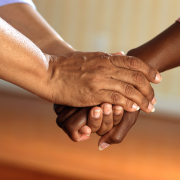What are the five stages of grief?
No matter your race, religion, location, or culture, you will experience the loss of a loved one because death is an inevitable fact of life. It’s not a matter of if but when. Therefore, grief is universal and experienced by people around the globe. According to renowned psychiatrist Elisabet Kubler Ross, people go through five distinct stages of grief when they lose someone they value. This theory on grief suggests people spend different times working through each stage.
Most of the time, these stages are not linear and they vary in intensity. The elements of grief could even feel cyclical at times, especially when something like an anniversary, a favorite song, or a painful experience triggers your memories. The onslaught of emotion is crucial for everyone to know for better coping and understanding. It’s important to comprehend what these feelings are and express them. Quashing these emotions and pretending they’re not there is detrimental to mental health. Learn more about the five stages of grief below.
Denial
Whether you’ve just gone through basic cremation or opted for a more elaborate graveside funeral with reception, one of the initial feelings that will assault you is denial. This stage helps people minimize the overwhelming and almost suffocating loss. A denial stage is a form of protection since it allows people to slowly process their new reality and find ways to cope with the emotional pain.
Denial or pretending the loss did not happen is akin to survival mode because it helps in slowing down intense emotions. It allows you to take things a day at a time. However, the bereaved don’t just deny the feelings, but also try to understand and come to terms with the loss. In this stage, people tend to reflect on the past experiences they shared with the deceased. It is also common to explore and imagine what life will look like now that the person is gone, although this new reality is still hard to accept.
Anger
When you’ve lost a loved one, it’s normal to feel angry. It’s one of the very first emotions released since anger is not a vulnerable feeling. This emotion may feel particularly strong especially when the death is sudden such as a heart attack, an accident, or a violent death related to a crime. This feeling may also reverberate loudly when the one that died is still young. You may feel that death is senseless and extremely unfair.
Anger is a very strong emotion so people tend to explode. You may find yourself being able to readily express anger with less fear of rejection or judgment. You don’t think but just react so there’s a danger of alienating others or feeling isolated in the process. Eventually, when the angry emotions subside, a clearer mind emerges and you begin thinking more rationally about the situation. When the angry feelings wane, you may be able to feel other emotions that you’ve temporarily cast aside.
Bargaining
After the death of a loved one, it is common to feel extreme, unfathomable pain. Bargaining stems from helplessness against your situation, so you tend to promise to do one thing in exchange for another. Often, you request something from a higher deity or power. For example, you may promise to quit smoking if your mother who’s terminally ill from cancer will live longer.
Bargaining can help you cope when things feel out of control. If this is your situation when your loved one has died, you may find yourself staring blankly at the cremation remains in an urn, thinking of various “what if” scenarios. You may also be running “if only” thoughts in your mind such as: “if only I did not give my child permission, he wouldn’t have been in an accident.” There’s a tendency to focus on regrets at this stage. You also identify perceived faults in the hopes of creating a better ending.
Depression
When bargaining is no longer an option, you have to face your current reality and what is actually happening. By the time your imagination and emotions calm down, you begin taking stock of your new normal. Once the adrenaline fog clears up, the loss feels more tangible, palpable, and unavoidable. Hence, in this stage, you feel immense sadness because you feel the loss more abundantly.
Moreover, there’s a tendency for your sadness to grow, so you may find yourself pulling inward. You may avoid people and reach out less to others because you want to drown in your own sorrows. Although it is a natural response to feel melancholic after the demise of a loved one, it could be dangerous if you don’t call for help. Bereavement support is important after death so you don’t stay completely isolated and spiral out of control.
Acceptance
Reaching a state of acceptance means you come to terms with your new reality. You no longer deny, resist, or try to struggle against the loss. Accepting the death of a loved one doesn’t mean you no longer feel the pain of their passing. It just means you no longer try to change it because you know the outcome will be the same.
Although you feel sad, the feelings of denial, anger, and bargaining are less present when there’s acceptance of the situation. You begin to reach out to other people more and begin letting go to move forward. Furthermore, you now have more happy days than sad days. It also comes with the realization that all the stages of grief are necessary for your healing.
Remember, no one experiences grief the same way. It’s a deeply personal journey for each individual. In addition, it’s vital to keep in mind that there’s also no timeframe for grieving. You just go through it and feel all the emotions as they come. It would help to bear in mind that you are never alone as you go through the different stages of grief. If you need assistance, call our Tranquility team so we can help you find an outlet to channel these emotions.








